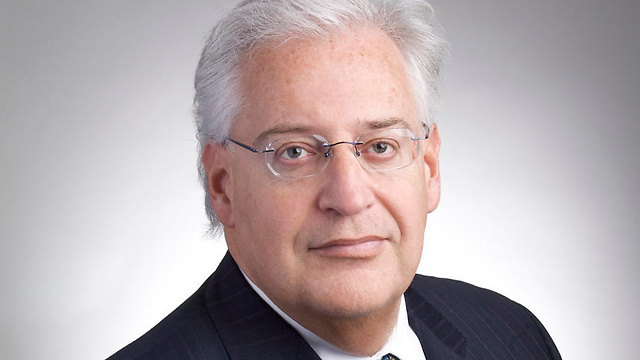
David Friedman, the next US ambassador to Israel
צילום: EPA
Who’s afraid of the right-wing US ambassador?
Op-ed: This is the first time Israel can deal with fundamental questions about its future and vision without any pressure from Washington. This is the first time in years that it has an opportunity to put something on the table that is not a repeat of outdated political slogans. Ironically, this opportunity is what people in both the Israeli Left and Right are afraid of.
Dan Shapiro arrived in Israel as the US ambassador in the worst period in terms of the relations between the two countries. President Barack Obama was photographed at the White House talking on the phone with Prime Minister Benjamin Netanyahu with his feet on the table pointed at the camera. He forced a construction freeze on Netanyahu which included every centimeter beyond the Green Line and clarified, by the way, that he was cancelling the understandings reached with President George W. Bush (in case anyone thought that a new president does not cancel decisions made by his predecessors).

In a historic visit to the Middle East, Obama promised the Arabs democracy and progress, but failed to visit the Jewish state.

David Friedman. The Left’s concerns are remarkably similar to the concerns that were voiced in the Right over Dan Shapiro’s appointment by Obama (Photo: AP / Kasowitz, Benson, Torres & Friedman LLP) (צילום: AP / Kasowitz, Benson, Torres & Friedman LLP)
Shapiro arrived with a heavy weight on his back and managed to shake it off. He will complete his term as the first ambassador who created tight relations with the ultra-Orthodox and settler sectors as well, with the political and ideological Right, although he grew up in the liberal Judaism that supported Obama. In fact, he is probably the only ambassador who plans to stay in Israel after the end of his term. The children are already Israeli, the spirit is mixed with the local breeze. Israel changed Shapiro more than he changed Israel as Obama’s representative. Even during the tough days, no one in the Right boycotted him. On the contrary, every conversation or meeting became a source of closeness.
This summary of Shapiro’s term is important in order to understand the absurdity of the criticism over the expected appointment of David Friedman President-elect Donald Trump’s associate, as the next US ambassador to Israel. Like Shapiro, Friedman is expected to implement the White House policy, not his own desires. I assume that the freed Shapiro will be able to advise him on how to deal with unpleasant situations when the distance between Washington and Jerusalem grows or shrinks according to passing interests. Like Shapiro, he will find himself meeting audiences he was unfamiliar with, connecting with people he did not agree with, being torn between Jews from there and Jews from here.
The only difference is that Friedman will arrive with wings rather than weights. Trump, and Friedman as his representative in the elections, promised that Israel would be a leading partner and not just another consideration. He promised that Jerusalem would be recognized as Israel’s capital and that the anti-Israel resolutions in the United Nations would be automatically vetoed. It seems that the Israeli Left should have embraced the new ambassador with all its might. These promises don’t include anything that the Israeli Left should not support, and they don’t include anything that would disrupt a scenario in which a different prime minister would rise to power. On the contrary, it should be a convenient start for any term and government in Israel.
But Friedman has spoken against J Street, supported (God forbid) a yeshiva in Beit El, and if that were not enough – he is a Jew who belongs to the Modern Orthodox movement – a combination which has already stirred the New York Times editorial board and the Israeli Left. It’s remarkably similar to the concerns that were voiced in the Right over Shapiro’s appointment, then Obama’s close advisor and a Conservative Jew.
I’m not one of Trump’s fans. I see him as an opportunist who knows how to manipulate the masses. The mirror he placed in front of the “real democracy” concept is profound and ugly, but in Israeli eyes he is mostly a promise and an opportunity.
This is the first time that Israel can deal with fundamental questions about its future and desired vision without any pressure from Washington. This is the first time in years that Israel has an opportunity to put something on the table that is not a repeat of outdated political slogans. Ironically, this opportunity is what people in the Israeli Left (and in the Right too) are afraid of. The problem is not Friedman, but the fear that threats of isolation, a diplomatic tsunami or a painful blow in order to restrain construction in Judea and Samaria will no longer be possible. This opportunity is also the fear in the Right that we will have to provide answers.
The embassy may move to Jerusalem, as it should have a long time ago. No one will stop the construction in east Jerusalem. Israel will be able to build settlements and expand wherever it decides, to determine the future of the E1 zone, but it will require the Netanyahu government to tell the American administration what it wants. When Netanyahu gives an interview to “60 Minutes” and talks about the need to get the Trump administration to help advance two states for two people, it’s the opposite. There is a new administration in America, and in Israel we need people who are not afraid.










